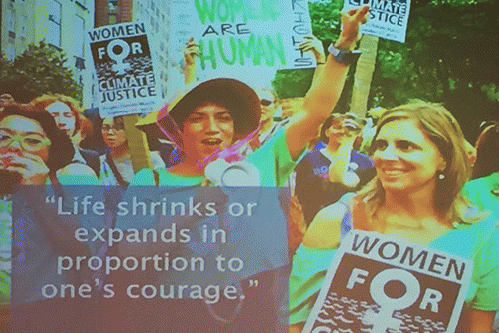Each year in September, New York City plays host to top changemakers who come to town for the United Nations General Assembly and related gatherings. It's a heady time for setting agendas.
At the Church Center of the United Nations on September 29, The Women's Earth and Climate Action Network (WECAN International) presented a four-hour symposium entitled, Women Speak: Climate Justice on the Road to Paris & Beyond.
The voices were dynamic and there was a palpable sense in the room that women in unison could create a tipping point on moving the needle.
WECAN co-founder and Executive Director Osprey Orielle Lake set the tone for the event, both in her opening remarks and through insights delivered during the proceedings. She had no reticence about calling out what she qualified as an "old construct" -- the "institution of patriarchy." Lake noted, "How we treat the earth is how we treat women. It's a violent paradigm."
Lake believes that what ensues after Paris will be critical. "Women's voices are key to changing this equation. Our red line is to protect future generations. We're not going to stop speaking out," she stated with urgency.
Drawing a correlation between women's "love for their children" and the "emotional and spiritual selves women bring to the table," Lake pointed to how "bottom-up action can scale."
"Women tell me all the time, 'We are the solution. We are the key to sustainability.' " Lake emphasized, "We need to get women in the driver's seat and at policy level."
Lake accentuated two facts reiterated by the other speakers:
The effects of climate change impact women tremendously.
Women are not just victims. They are leaders.
In addition to referencing the "healing nature of women," Lake was quick to pronounce, "We also have a sword in our hands."
A key piece of The Women's Climate Declaration (ratified September 2013), is a sentence in the preamble declaring:
"Among the most severely vulnerable to climate change are women, Indigenous Peoples, and those who live in extreme poverty."
These words are a clarion call to the "moral imperative" piece of the climate crisis. It focuses on structuring a response to challenges through an environmental justice prism, which clearly identifies the damage being done to "frontline communities."
Women activists from affected populations were front and center on the first panel.
(Note: You can view every article as one long page if you sign up as an Advocate Member, or higher).






